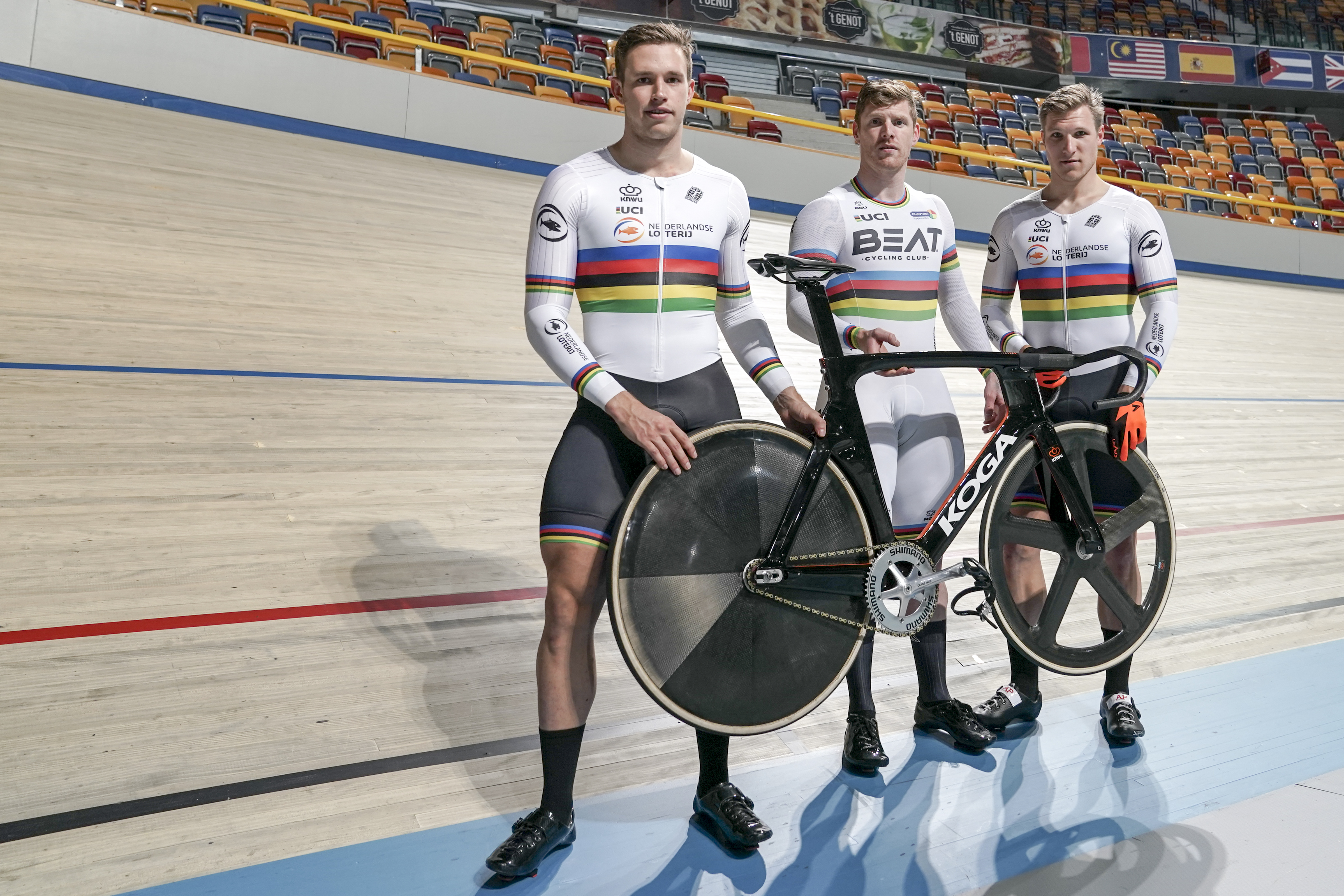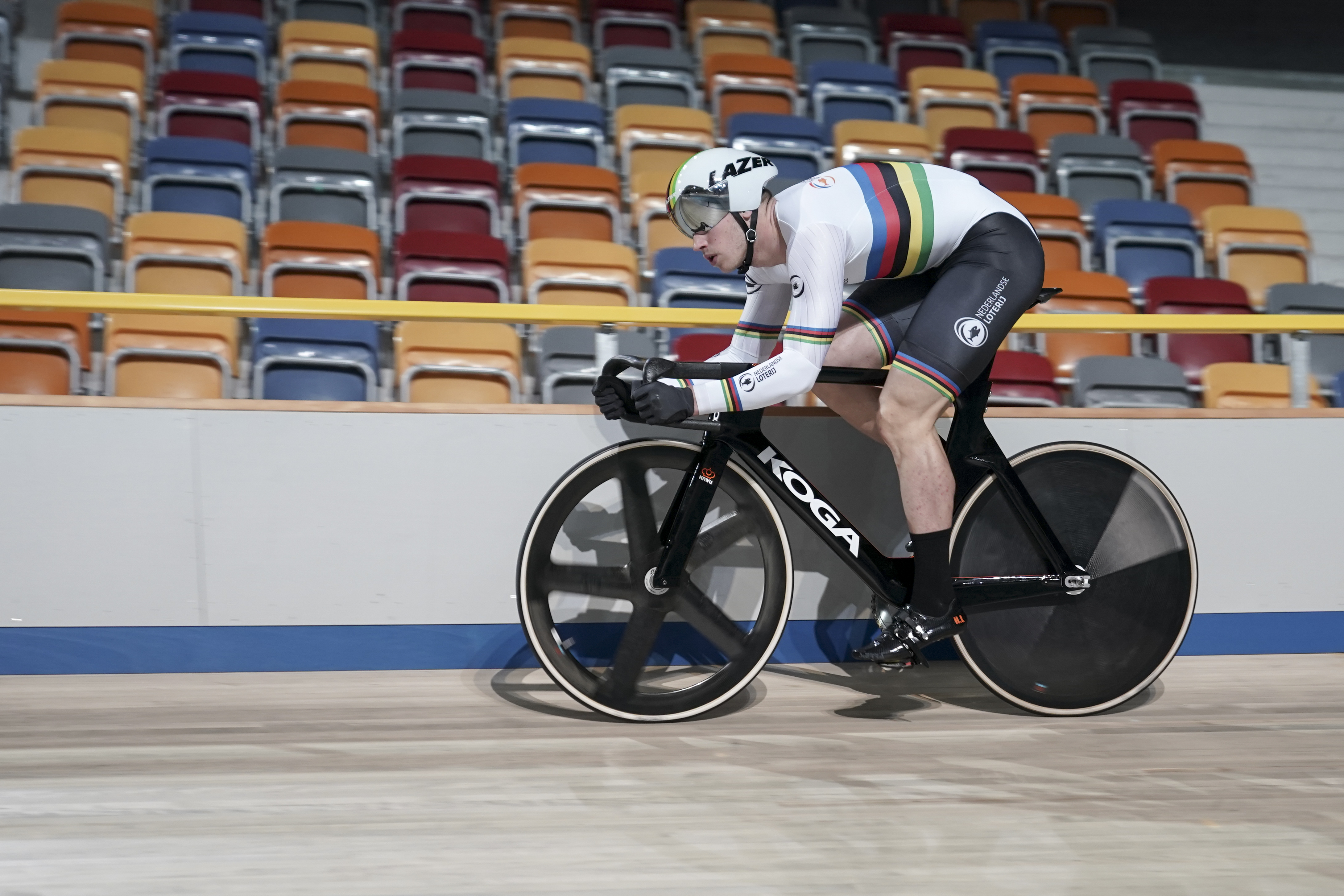Unveiling of new track bike for 2020 Olympic Games in Tokyo
The Royal Dutch Cycling Federation (Koninklijke Nederlandsche Wielrenunie, KNWU), bike manufacturer KOGA and TU Delft unveiled the new track bike on Wednesday 29 May. The bike is predicted to contribute to achieving good results at the Olympic Games to be held in Tokyo next year. It has been designed to deliver an optimum combination of light weight and aerodynamics as well as correspond to the individual characteristics of the cyclist and his or her particular discipline. The bike is expected to yield an advantage of 0.5 seconds during the team sprint event.
KOGA had already developed a special bike, the Kimera, for Theo Bos for the Beijing Olympic Games. This time around, in Tokyo, new track bikes will be designed and developed for the entire Olympic cycling team – specifically tailored to each individual cyclist. The cyclists in the national team selection and their training staff played an active role in the development of the new bike. In addition to collaborating with the KNWU and TU Delft in this project, KOGA also worked closely with Pontis Engineering and Actiflow.
Foto credits: KOGA.
Role of science
Multiple disciplines from TU Delft were involved in the development of the new track bike. TU Delft conducts extensive research into the stability and steering of bikes. This expertise has been incorporated into the new track bike design.
‘It is important to tailor the geometry of the bike to the cyclist in such a way that the bike is as manoeuvrable as possible, while ensuring that all of the cyclist’s power output is converted into forward speed,’ explains researcher Arend Schwab. At the same time, aerodynamicists have devised new methods of further reducing drag. Together with Actiflow, wind tunnel tests were carried out in the wind tunnels at the Faculty of Aerospace Engineering at TU Delft to optimise the aerodynamics.
Bike built around the cyclist
Ultimately, each Olympic cyclist will receive a custom-made KOGA track bike. The frame and handlebars have been adapted to the individual cyclist’s length and posture, ensuring stability of the bike. This is important because sprinters in particular exert unprecedented forces on the bike at peak times at the start or in full sprint. Arend: ‘A number of cyclists indicated that they had trouble during peak times keeping control of the old bike. This was not due to the frame, because that was rigid enough. It all had to do with the steering mechanism. To a large extent, this is what determines the bike’s handling qualities.’
‘The trainer of the track team had already discovered that a number of cyclists were using bikes that were too small for them,’ recalls Arend. ‘The task for us as designers was to build a bike that fits around the individual cyclist so that he or she can exert maximum force. This meant a completely opposite approach. The bike is not built independent of the cyclist who will ride it. We looked at each individual and then built the bike specifically around them.’ The European Championships in Apeldoorn in October will be the first opportunity for the cyclists to test their custom-made bike in competition.
Foto credits: KOGA.
Satisfied with the collaboration
National coach Hugo Haak is satisfied with the new bike: ‘Developing the new track bike has been a very enjoyable project with a fantastic team of scientists and specialists designing the best and fastest track bike in the world. The results have exceeded my expectations. This gives us an extra incentive to do everything we can to be successful in Tokyo in the sprint races.’
As a scientist, Arend Schwab also felt it was a great project. This assignment gave him an opportunity to apply the expertise from his bike research as well as helping him along in his current work. ‘Until now, our research was focused on the everyday city bike. We never looked at bike racing in detail; this is done at high speeds and in a special posture. I find it extremely interesting to see what is involved and we have learned a lot from it.’
Harald Troost, International Brand Manager at KOGA, is satisfied with the collaboration: ‘We showed by winning six world titles at the Track Cycling World Championships in Poland in March this year that our current KOGA Kimera model is very successful. Our new “Tokyo” track bike once again demonstrates the innovative capacity of KOGA. We worked extremely closely with our partners during the past two years to produce a bike that is 35% more rigid, 15% lighter and 24% more aerodynamic.’
More information
TU Delft
Dr Daan Bregman (Coordinator TU Delft Sports Engineering Institute), d.j.j.Bregman@tudelft.nl, +31 (0)6 2446 2917
Arend Schwab (Researcher TU Delft), a.l.schwab@tudelft.nl, +31 (0)6 2852 7539
Lenny Bakker (TU Delft Media Relations Officer), L.Bakker-1@tudelft.nl, + 31 (0)6 4422 7176
KOGA
Harald Troost, h.troost@accell.nl


